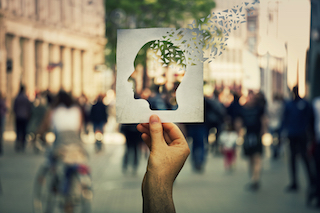 According to Dr. James S. Gordon, it can.
According to Dr. James S. Gordon, it can.
Dr. Gordon believes trauma touches us all at some point in our lives and that his evidence-based program outlined in his new book, The Transformation, can reverse the psychological and biological damage caused by trauma.
"The research we’ve done shows that this program is remarkably effective in relieving symptoms of post-traumatic stress disorder," Dr. Gordon told us. "An 80% decrease in kids and adults in countries devastated by war and also, in improving the mood, increasing the energy and focus, making sleep easier and life happier and more hopeful for high-functioning but stressed out American adults, including physicians, medical students, and mental health professionals."
According to the National Trauma Institute, trauma is a result of a physical injury. Trauma is the number one cause of death for people aged one to 46 and costs the economy $671 billion per year in health care and lost productivity. But according to Dr. Gordon, trauma can also be an injury to the mind or spirit in addition to the physical body.
“The conventional medical view, and perhaps the conventional social view, is that trauma is exceptional, that it only comes to people who have been combatants or civilians in a war, or those who have lived in horribly abusive and destructive families,” Dr. Gordon told us. “My own understanding is that trauma comes to all of us, sooner or later. If not early in life because of abuse, neglect, poverty, and discrimination, then as adults when we deal with the challenges of jobs, relationships, and living in an increasingly threatening and dangerous world. And if we don’t experience trauma then, we surely will as we grow older, become frail, lose those we love, and have to face our own death.”
Based on Dr. Gordon’s half century as a mind-body medicine pioneer and an advocate of integrative approaches to overcoming psychological trauma and stress, Dr. Gordon’s book teaches readers that each of us has the capacity to heal ourselves. Outlining a proven, step-by-step method, he demonstrates how to reverse the damage caused by trauma and to restore hope.
“The program in The Transformation is step-by-step, evidence-based, practical and clearly spelled out,” Dr. Gordon told us. “It begins with slow, deep soft belly breathing that balances out the agitation, anxiety, and tension of the fight-or-flight response and goes on to show how drawings can help us to mobilize our imagination and discover new hope.”
The Transformation continues, chapter by chapter, to describe trauma-healing techniques and tools including active, expressive meditations to break up fixed, destructive patterns of fear and tension in the body and mind; imaginative techniques like guided imagery and written dialogues to help access the intuition that can successfully address problems that seemed insoluble; ways to befriend a body that may feel foreign or even alien, especially after physical or sexual trauma; instruction in creating and implementing a trauma-healing diet; ways to use connection to other people, the natural world, and animals to help heal; chapters on accessing and enhancing capacity for gratitude and forgiveness; one on using laughter to break up the preoccupied seriousness that so often chains one to traumatic memories; and methods for exploring the ways families (including ancestors) may have hurt and limited us and how family, friends, and teachers can also help us move through and beyond our trauma.
Dr. Gordon says modern psychology is catching up and that mental health professionals are recognizing the possibility of ‘post-traumatic growth’, that “the trauma that breaks our hearts can also open our hearts and our minds to new possibilities, greater compassion, a broader understanding of why we are here on this planet.”
Dr. Gordon is the founder and executive director of The Center for Mind-Body Medicine (CMBM). At the CMBM, Dr. Gordon and his faculty brought the program to populations as diverse as refugees from wars in the Balkans, the Middle East, and Africa; firefighters, U.S. military personnel, veterans and their families; school shooting survivors; and Native Americans—as well as stressed out professionals, stay-at-home mothers, inner-city children, White House officials, health professionals and medical students, and people struggling with severe emotional and physical illnesses.
“I understand that when trauma comes, it will shake us to our core and throw into question all our ideas about who we are and how our lives should be,” Dr. Gordon told us. “I also understand that trauma is an opportunity, that it is the school in which wisdom can grow. This understanding is ancient. Aborignal people know it. The Greeks who gave us western medicine as well as our western literature appreciated this painful, hard-won knowledge. I know it too from my 50 years of therapeutic work with people of every imaginable age, class and ethnicity, and from what I have experienced in my own long life.”
Patricia Tomasi is a mom, maternal mental health advocate, journalist, and speaker. She writes regularly for the Huffington Post Canada, focusing primarily on maternal mental health after suffering from severe postpartum anxiety twice. You can find her Huffington Post biography here. Patricia is also a Patient Expert Advisor for the North American-based, Maternal Mental Health Research Collective and is the founder of the online peer support group - Facebook Postpartum Depression & Anxiety Support Group - with over 1500 members worldwide. Blog: www.patriciatomasiblog.wordpress.com
Email: tomasi.patricia@gmail.com